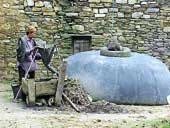 |
 |
| Lal Bahadur Bhujel checks out the bio gas tank (top) and Gurung Guesthouse. Picture by Suman Tamang |
Tinchaulay, (Takdha) May 30: Innovation has been the key to success for the villagers of this sleepy hamlet which has not only excelled in tourism promotion but is now seen as a model of rural development.
The 17-house village has made the most of its tranquil environs and attracted droves of tourists in the recent past. Now it has added another feather to its cap through organic farming with bio-gas and a successful apiculture project.
The villagers have formed the Tinchulay Model Village Committee, which oversees all development work in the area and ensures that progress takes place in accordance with the need of the residents. The hamlet has also been adopted as a model village by the Save Enviornment and Regenerate Vital Employment Activity (SERVE) project of the Worldwide Fund for Nature (WWF), which is providing technical assistance to its endeavours.
President of the village committee R.S. Gurung said: “The panel was formed in 1999 and WWF has also been helping us since then. The committee assesses the development needs of the village and acts accordingly.”
While three families in the village have turned their homes into guest houses, others decided to opt for bio-gas production, manufacture of hand-rolled tea and apiculture.
Tinchulay has also bagged the Most Innovative Product award at the Travel and Tourism Fair 2002 in New Delhi.
“The success of the projects in this village is due to the fact that ideas have not been imposed from outside. The development process is participatory in nature so there is much enthusiasm among the residents of the hamlet,” said Prabhat Rana, a senior project officer in SERVE.
The WWF has provided logistical assistance and given villagers equipment like chaff-cutter and a slug tank for the bio gas project.
Lal Bahadur Bhujel, a villager who opted for bio-gas, said:“We do all the cooking and since I have six cows, the bio-gas scheme is of great help. SERVE has provide me with everything I needed. Earlier, I had to shell out Rs 40 for a maund of firewood,” he said.
For those like Doma Sherpa, who have set up a metered-garden, the ability to produce non-seasonal vegetables has come as a great help.
“I recently sold spinach worth Rs 500, which was unthinkable earlier. Since the vegetables are now grown in a fixed area, the quality is better. I have also been able to protect the vegetables from pests and insects, which used to ruin my efforts earlier.”
Sherpa also grows carrots, cabbage and cauliflower.
The transformation of the village into a coveted tourist destination is another important achievement for residents.
R.S. Gurung, the proprietor of Gurung Guesthouse, said: “I had never thought that this could be a tourist destination. Now it is one of the favourite haunts of serenity seekers. My guest house is fully booked most of the time.”
Even though a number of people had shown an interest in setting up commercial lodges in the village, the committee refused permission in order to protect the environment.










